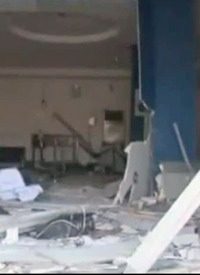
Shortly after the November 4 murder spree, a spokesman for the Nigerian Jihadist group known as Boko Haram operating primarily out of the Islamic north of Nigeria claimed responsibility. The anti-Western terror organization seeks to extend Sharia law to the largely Christian southern half of the nation while consolidating Muslim rule in northern states.
Death-toll estimates cited in media accounts vary widely. But according to a rescue official cited in multiple reports, over 150 people were killed. Hundreds more were wounded and remain hospitalized.
Among the targets in Yobe state were the Anti-Terrorism Squad office, churches, various federal buildings, several police stations, a bank, an Islamic theological college, and more. The apparently coordinated attacks hit at least two cities in Yobe: the state capital Damaturu and Potiskum.
In the far north-eastern state of Borno, believed to be Boko Haram’s birthplace, suicide bombers in the city of Maiduguri attacked the military, secret-service headquarters, and other targets. Three attackers and at least one soldier were reportedly killed.
An Army spokesman blamed the attacks there on Boko Haram, the BBC reported. And a man claiming to be a spokesman for the Islamist group reportedly called a top Nigerian newspaper to claim responsibility for the attack.
“We will continue attacking federal government formations until security forces stop their excesses on our members and vulnerable civilians,” the Boko Haram spokesman was quoted as saying. “More attacks are on the way.”
The deadly attacks began on Friday afternoon, the day before the Islamic holiday of Eid al-Adha honoring Abraham’s obedience to God. Gun battles between government forces and the attackers reportedly lasted for hours.
Closer to the federal capital, riots broke out on November 4 in the towns of Zonkwa and Kaduna after a church was attacked by Islamist gunmen. Thousands of Muslims were forced to leave the area in April following a turbulent election, according to a BBC report. And many vowed to seek revenge.
Several years ago, the Nigerian government brutally quashed an uprising by Boko Haram in the state of Borno. The group’s leader at the time, Mohammed Yusuf, was captured by police and killed in custody in what critics called an extra-judicial murder.
Since then, the government’s aggressive response has reportedly served as a key recruiting tool. The Associated Press reported over the weekend, citing human rights activists, that the military has also recently been beating and killing civilians in the hunt for Boko Haram.
In October, the group is believed to have attacked a military base before murdering a member of Parliament. And an August attack against a United Nations building that was attributed to Boko Haram in the capital, Abuja, left 24 dead and over 100 wounded.
Some reports claim Boko Haram is linked to al-Qaeda and its affiliates like al Shahab in Somalia. Other analysts, however, have connected the group to the toppled regime of Libyan strongman Col. Muammar Gadhafi — al-Qaeda’s sworn enemy.
But according to news reports, its grievances are largely local in nature. “We are demanding an Islamic government be established in the northern states. Not this kind of democratic government,” a spokesman for Boko Haram told BBC earlier this year. “There is not real Sharia in northern states.”
In addition to attacking authorities and Christians, the group has reportedly assassinated Islamic clerics who criticize it as well. But in recent years, according to experts, Boko Haram has splintered into at least three competing factions: One seeks to end the violence, another wants to negotiate with the government, and a third refuses to talk at all.
Boko Haram roughly translates to “Western education is a sin” or “Western education is forbidden.” But the group’s official name, Jama’atu Ahlis Sunna Lidda’awati wal-Jihad, means People Committed to the Propagation of the Prophet’s Teachings and Jihad.
Formed about a decade ago, the fundamentalist Islamic organization did not become widely known until about 2009 after a series of deadly clashes catapulted it into the international spotlight. Since then, it has freed hundreds of prisoners and been implicated in thousands of deaths — more than 300 just this year.
Nigeria is Africa’s most populous nation, with some 160 million people. It is also a top oil exporter. Like throughout much of the continent, sectarian and religious violence is becoming increasingly common in Nigeria. And more bloodshed is widely expected.
Photo taken from Nigerian state-run TV showing damaged building following Nov. 4 attacks: AP Images
Related articles:
Nigerian Churches Bombed at Christmas
Nigerian Muslims Responsible for Christmas Attacks



